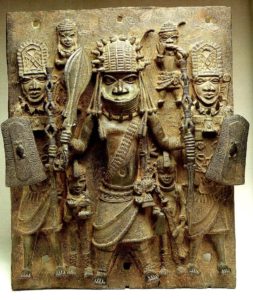by James Weeks | Oct 4, 2012 | Blog
The poetic elegance of the Yoruba creation story moved me.
And I thought about it for days. It made me reflect on spirituality as well as what science says about the birth of humanity and the origins of the universe.
Here’s an excerpt of the sacred story as related by Ifa priest, Chief Solagbade Popoola
 “In the beginning that signified the end. It was the beginning of the beginning and the beginning of the end. It was the beginning of existence and the end of nothingness. It started in a sporadic but gradual manner. It started at a time that was timeless. It began in a form that was in itself without form. It started with a Being that cannot be described with any adequacy. This Being is neither a ‘he’ nor a ‘she’. The Being is neither human nor superhuman. It has neither flesh nor blood. It has no water. It exists in a body that is in itself without body. It is the universal spirit of the universe. That is the Being which started the universe from nothingness. It is not from the void as some people say, because void itself is something. The universe started from nothing, absolutely nothing. This universal spirit that began the universe is known as Akamara.”
“In the beginning that signified the end. It was the beginning of the beginning and the beginning of the end. It was the beginning of existence and the end of nothingness. It started in a sporadic but gradual manner. It started at a time that was timeless. It began in a form that was in itself without form. It started with a Being that cannot be described with any adequacy. This Being is neither a ‘he’ nor a ‘she’. The Being is neither human nor superhuman. It has neither flesh nor blood. It has no water. It exists in a body that is in itself without body. It is the universal spirit of the universe. That is the Being which started the universe from nothingness. It is not from the void as some people say, because void itself is something. The universe started from nothing, absolutely nothing. This universal spirit that began the universe is known as Akamara.”
According Popoola, who has authored several books about Ifa, our sacred teachings insist there were five stages of creation. In the first stage, the universal spirit, Akamara, created a grain of sand, “blew its mighty breath into it and transformed this grain into a basket of sand from which hot gases and dews began oozing out.
Then, a mighty explosion ensued for an “uncountable period of time and the whole universe was engulfed in gases and dews.”
Ifa says, “the mightiness of the whole universe today is just the breath of Akamara.”
Here’s my question. Could the mighty explosion be a reference to the Big Bang that science refers to?
In stage two, “the solidification of gases and dews into stars and other heavenly bodies brought about another development. It was discovered that the stars and other heavenly bodies were too hot and would not be able to accomplish the mission which Akamara created them for. These stars needed to cool down from their ultra high temperature to a normal temperature.” Hence, Akamara created another being called Olu-Iwaye who successfully cooled down the stars and made it possible for them to solidify quickly.”
In stage three, a super being, or Irunmole, called Baba Asemuegun Sunwon was created because “it was discovered that the stars and other heavenly bodies had no orderly movement and were crashing into each another, causing mighty explosions. The mission of Baba Asemuegun Sunwon was to make all the heavenly bodies to rotate in an anti-clockwise orbit in order to stop what Ifa calls “The War of the Stars”. When this was done, the stars and other heavenly bodies stopped crashing into each other.
I was fascinated by the poetic imagery of stars streaking across the heavens against a darkened sky colliding into each other. In fact, I love it so much I’m toying with the idea of incorporating some of this imagery in my film, Across The King’s River.
But let’s move on.
In stage four, life was created on earth. The teachings of Ifa insist we are still in stage four but most evolve if we hope to survive and save the planet.
“We need to stop wasting and using up all our natural resources in an ignorant and arrogant manner. We need to stop the abuse of our fellow man in all parts of the world. We need to stop using technology that destroys the environment. We need to stop wars. We have to relearn to live in harmony with all that exist on the planet,” Popoola says.
Very few would disagree with this, I’m sure. But can we summon the will? Time will tell.
I began this post by saying how the Yoruba creation story made me reflect on science and spirituality.
The creation story also made me reflect on one of my favorite books of all time: Vanishing Voices: the Extinction of the World’s Languages. (To hear my interview with Daniel Nettle, co-author of Vanishing Voices, visit:http://acrossthekingsriver.com/press/
You see, the sacred stories (and traditions) of the world are important not only because they allow us to glimpse into other cultures, but because they may help unlock scientific mysteries and provide answers to some of the most vexing challenges of our times.
But as the authors of Vanishing Voices point out: more than 90 percent of the world’s languages may die out in the next century, and when these languages die, we lose ancient knowledge, centuries and centuries of indigenous science and wisdom because the accumulated knowledge of humanity is encoded in language.
“We do not even know what exactly we stand to lose – for science, for posteriority – when languages die,” says linguist K. David Harrison in the book, When Languages Die. “An immense edifice of human knowledge, painstakingly assembled over millennia by countless minds, is eroding, vanishing into oblivion.”
Because Ifa is a vast body of ancient oral knowledge, surely it has a role to play in this crucial debate about vanishing languages and cultures.
May the ancestors grant us the wisdom and the fortitude to keep our sacred traditions alive.
Blessings
by James Weeks | Aug 2, 2012 | Blog
The spirits of the dead may play a much bigger role in our health, wealth and happiness than we realize, says Dave Cumes M.D., an accomplished surgeon who is also known for his expertise in African healing traditions.
Cumes has taught at Stanford University and has a private urology practice in Santa Barbara, California. He is also a fully initiated “sangoma”, or medicine man who spent years studying the sacred healing traditions of his native South Africa. 
He is committed to bridging Western medicine and African healing wisdom.
“Western scientists believe that they are on the cutting edge of the new age of healing. However, we may have missed the boat entirely. We may be technical wizards but when it comes to the human spirit, we are really only beginners,” says Cumes.
“Many sangomas cannot read or write but they understand the principles of healing better than most Western-trained physicians,” adds Cumes, who lectures extensively and also provides spiritual readings, or divination sessions for clients.
Cumes believes Westerners can learn a lot from African sacred traditions. “Although some of the principles are difficult to understand, they work. They are the roots of healing, and they are still practiced to this day. We can only benefit from what we can learn from them,” Cumes says.
Perhaps Westerners can start by developing a relationship with their ancestors. “Indigenous African people believe in the ancestors and that they are there to help, protect and sustain us. If your ancestors turn aside, you are defenseless in life, like a paper blowing in the wind. If we are attentive and listen carefully for their messages, we will enjoy more health, wealth, and happiness,” he says.
In his book, Africa In My Bones, Cumes cites a study conducted by researchers at John Hopkins Medical Center which suggests a link between health and one’s relationship or lack of relationship with family.
“Researchers at the John Hopkins Medical Center studied the health of a group of more than one thousand medical students from the classes of 1948 to 1964. Researchers discovered that those physicians who developed cancer had much lower scores on closeness to parents, especially to their fathers,” says Cumes.
Cumes, who will share some of his insights in “Across The King’s River,” an upcoming documentary film by James Weeks that explores African healing traditions and modern science, says the research is still ongoing. “As Westerners, we might say that the parent’s love created lifelong balance, stability, and meaning and that it facilitated good health in the child. Indigenous African belief, however, may attribute the progeny’s good health to the dead parents’ and the grandparents’ protective spirits,” explains Cumes.
Weeks said it is gratifying to see that the Western medical establishment is finally starting to see value in what African healers have been saying and doing for centuries. “Maybe one day when you visit your doctor in the West or a psychologist, they’ll ask: ‘Do you have a relationship with your ancestors?” says Weeks with a laugh.
And how does one build a relationship with ancestors?
“One of the most effective ways to connect with ancestors is to set up an ancestor altar or shrine,” says popular African shaman Malidoma Some. “Doing so provides us with an invaluable tool to help focus our attention and awareness of their presence in our lives. It is also a tool to help deepen and nurture a relationship with them. There is no correct way to build a shrine to the Ancestors; use your intuition and imagination! It can be as simple or elaborate as you wish. Let the ancestors guide you!”
Malidoma, one the leading voices of African spirituality in the West, will also be featured in the film Across The King’s River. On his website, www.malidoma.com, Malidoma provides the following tips for building an ancestral shrine.
Choose a comfortable location in your home (or on your land) that can be designated as sacred space.
Choose a table or flat surface of any size or shape. Using a space on the floor or ground is fine.
You can choose to cover the surface or not. If you do, choose a cloth of any color or fabric. Items to put on the shrine can include:
Photographs of deceased family members or names written on paper
Cherished personal items passed down to you from relatives
A glass or bowl of water
Candles
Flowers or plants
Rocks or dirt from your Ancestors’ place of birth or homeland
Food and drink. This can be a small portion of your meals set aside for the Ancestors. Or you can place fresh fruit on the shrine
Spirits of alcohol, i.e. vodka, gin, rum, whiskey
Keep in mind that what is important is your sincere effort and good intention. Building an altar to the ancestors can be fun! There will come a time when the Ancestors will speak to you about what they want on their shrine. Pay attention and just listen!
How you honor and revere your ancestors is a personal thing. At your altar you can pray, talk, sing, chant, cry, meditate, recite poetry, etc. You can whisper or shout to them the most intimate details of your life. There is no right or wrong way to communicate with them and pay your respects. The important thing is that you do, and that you are sincere and genuine. It must come from your heart! In return, the ancestors will provide guidance, encouragement, and support. In time, your relationship with them will grow and you may find that you look forward to a daily commune with your ancestors.
For more information on Across The King’s River, visit www.acrossthekingsriver.com
by James Weeks | Jun 12, 2012 | Blog
I still hear the voice, the laughter and the wisdom. I have no doubt that the spirit of Dr. Afolabi Epega is with me as I sit with clients to practice the ancient art of Ifa divination. 
What is he saying to me? “The answer is not in the book, the answer is on the divination table. Speak the truth and let the client deal with the truth. Divination is not about what you remember; it’s about what you see as you cast the opele (divination chain). You can’t know everything about Ifa – no one does. But as long as you divine correctly, you will have an insight,” he tells me.
I also sense Epega’s is with me as I work on the vision for this film. What is he telling me?: “Just listen to the voices of the ancestors and allow us to work through you. As long as you follow our voice you can’t go wrong. Submit completely to the vision and don’t look behind you. Failure is not an option. Maintain the faith at all times. Keep moving forward because Across The King’s River film will rekindle the spirit of the masses,” says Dr. Epega from the Spirit World.
Dr. Epega passed over in 2006. A few days after his passing, I felt moved to write a tribute to him. You can read A Tribute to Afolabi Epega at this link:
Baba Epega, as he was affectionately called, was an accomplished scientist with an honors degree in organic chemistry and a 5th generation Ifa priest, or babalawo, who penned Ifa: The Ancient Wisdom, Obi: The Mystical Oracle and co-authored The Sacred Ifa Oracle. His mission in life was to show the connection between science and spirituality. The idea of showing the link between African spirituality and science in my film is inspired by the mission of Baba Epega and one of his students, Christopher Brown, a brilliant mathematician and Ifa priest.
Although I loved Baba Epega, I didn’t have a full appreciation for his wisdom until recently. Being a scientist, he challenged us to be innovative. Respect the tradition – but don’t allow it to stifle your growth. True spirituality is not about stagnation – it’s about the constant quest for growth. Find what works for you, then have the courage to embrace it even if it flies in the face of convention.
As I point out in my article, A Tribute to Dr. Epega, I didn’t accept his views on gays relationships and I found him to be sexist at times. Still, I am grateful for his significant contributions to Ifa. As I move forward on my journey, I do so with the full confidence that the old master is standing right behind me, guiding each step, ensuring that the sacred traditions of our ancestors will guide and nourish the next generation.
 “In the beginning that signified the end. It was the beginning of the beginning and the beginning of the end. It was the beginning of existence and the end of nothingness. It started in a sporadic but gradual manner. It started at a time that was timeless. It began in a form that was in itself without form. It started with a Being that cannot be described with any adequacy. This Being is neither a ‘he’ nor a ‘she’. The Being is neither human nor superhuman. It has neither flesh nor blood. It has no water. It exists in a body that is in itself without body. It is the universal spirit of the universe. That is the Being which started the universe from nothingness. It is not from the void as some people say, because void itself is something. The universe started from nothing, absolutely nothing. This universal spirit that began the universe is known as Akamara.”
“In the beginning that signified the end. It was the beginning of the beginning and the beginning of the end. It was the beginning of existence and the end of nothingness. It started in a sporadic but gradual manner. It started at a time that was timeless. It began in a form that was in itself without form. It started with a Being that cannot be described with any adequacy. This Being is neither a ‘he’ nor a ‘she’. The Being is neither human nor superhuman. It has neither flesh nor blood. It has no water. It exists in a body that is in itself without body. It is the universal spirit of the universe. That is the Being which started the universe from nothingness. It is not from the void as some people say, because void itself is something. The universe started from nothing, absolutely nothing. This universal spirit that began the universe is known as Akamara.”

